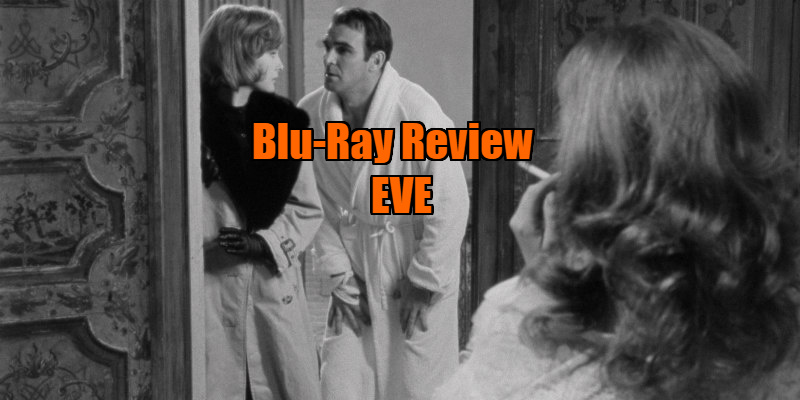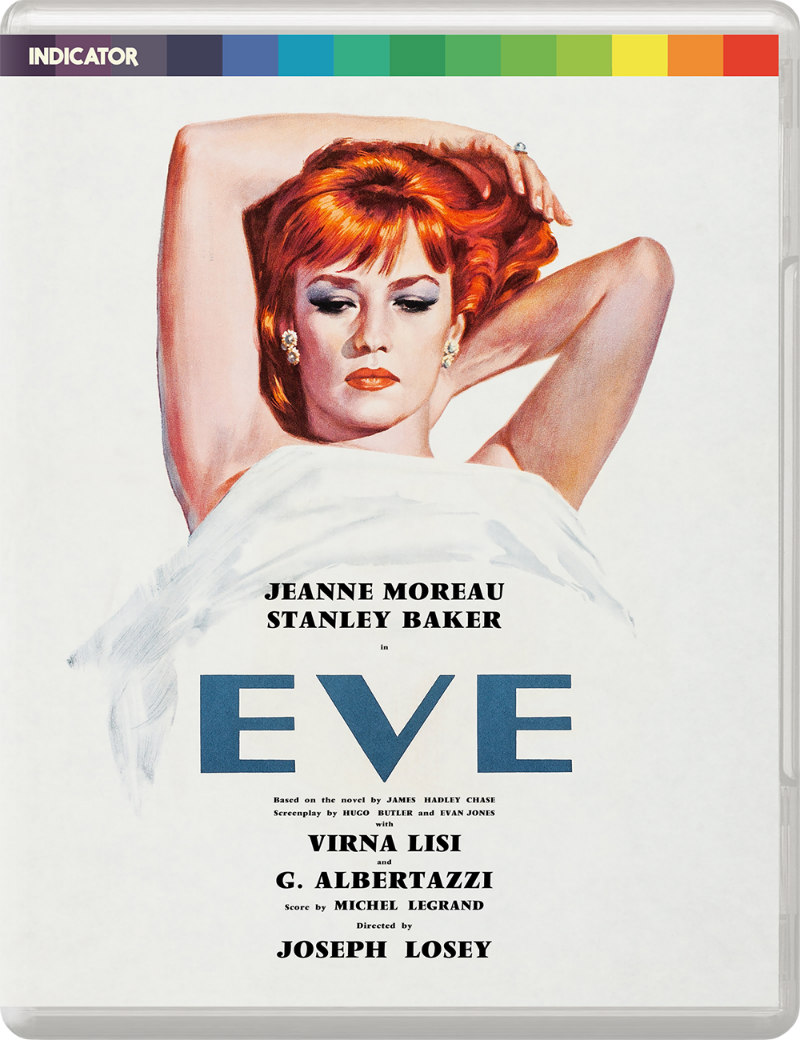
Review by
Jason Abbey
Directed by: Joseph Losey
Starring: Jeanne Moreau, Stanley Baker, Virna Lisi, James Villiers, Riccardo
Garrone, Lisa Gastoni

Eve is a film that leaves you unbalanced and uncertain;
there is just something slightly off about it. 10 minutes in and you can
understand why it was so disliked and dishonoured at the time of release.
Take Stanley Baker as Tyvian Jones, a writer of the angry young men
school whose literary success has now been translated into a film. The
character should be brooding, masculine and opinionated, a role crying out
for a young Richard Burton. Instead there is something weak and petulant
in Baker's performance that is off-putting. Then it all starts to make
sense. This is a film about performance and acting, romance as both
masquerade and charade, a relationship that plays like a hostage
negotiation.

Leaving the after party celebrating the premiere of his book to film,
Tyvian returns to his secluded house in Venice. In a none more '60s turn
of events, an older man and his French Courtesan Eva (Jeanne Moreau) seek shelter from a downpour (and presumably a place to fuck) by
breaking into said house. By the time Tyvian arrives home, jazz records
have been rifled through, a bath has been drawn and the drinks cabinet is
getting a seeing to. Rather than call the Carabinieri, Tyvian is a
slightly more gracious host (until he eyes up Eva) before changing his
mind and throwing out Eva’s punter so that Tyvian can make his move on her
instead.
What follows is a battle of wits between two of the most unlikeable
protagonists in film history. Tyvian seems to have it all, a burgeoning
career as a novelist, a fiancée, Francesca (Virna Lisi), who dotes
on him, and some pads in the swankiest part of Italy. Francesca works for
the producer of Tyvian’s film and it is his mistreatment of her that
proves his undoing, evoking mistrust for his lack of fidelity and the
truthfulness of his angry young man persona.

Eva and Tyvian don’t conduct what you would call a typical affair; this is
more seduction as performance. She confesses to being abused as a child
then laughs it off as a lie. He is prone to uttering statements that
haven’t aged particularly well like "I love all women from six to 60" to
excuse his urges. Eva keeps Tyvian in a state of unconsummated excitement
(locking him out when he escorts her to his flat or whipping him with a
riding crop that hints at a BDSM side to their lust) that is reminiscent
of Dr Hfuhruhurr in The Man with Two Brains. You can tell the relationship is unhealthy because he goes from a
teetotaller to a binge drinking lush during the course of their
relationship (or a lapsed alcoholic, it’s never clear). Tyvian’s lie is
revealed and the weakness of Baker's performance begins to make sense.
At the time of release, Moreau’s performance faced a lot of criticism as
an archetypal femme fatale with no nuance. That she is an unlikeable bad
girl is not in doubt, but it feels more like armour. She seems both
repelled by her own sexuality and the ease with which it ensnares men. She
is actively hostile to Tyvian, but it does not seem to put him or any of
the other men in her life off. The confession of abuse may be more than a
glib lie to shock her paramour. She may be vicious but she seems honest, a
profoundly damaged woman who controls men and meretricious trinkets as the
only vestige of power in a deck that is resolutely stacked in favour of
men.

As a battle of wits it is fabulous, but Losey lacks focus. There are a few
too many ancillary characters, including an ex-pat writer, that are
unnecessary, and a few contrivances that see Tyvian abandoning a wedding
to be with Eva that have the ring of farce rather than lust. Francesca
looks the part as his fiancée, but we are never convinced by the
relationship - it feels more like a casual flirtation with a secretary
rather than a doomed romance. As a 90-minute bilious, blackly comic drama,
this could have been an unheralded classic. There is very little of La
Dolce Vita in this acerbic drama that boasts one of the most splenetic
couples in cinema history, but there is plenty to enjoy in a film that if
not quite an unheralded masterpiece, is still far greater than its
reputation would have you believe.

Extras:
This special edition comes with three versions of the film. The longest
is a restoration based on Losey’s notes and other comments that is the
closest to the director's original vision. There is also a truncated
European release and the alternative US release under the name 'The
Devil’s Woman'.
Losey discusses Eve in an excerpt from the French television programme
Cinéma.
A short interview of Moreau in conversation with actor France Roche.
The most substantial extra is an archival audio recording with Reginald
Beck, the editor of Eve, made as part of the British Entertainment History Project in
conversation with Alan Lawson.
An interview with filmmaker Gavrik Losey, son of Joseph Losey.
An appreciation by author and film historian Neil Sinyard.
A video comparison of the differences between the various versions of
the film.
The standard image gallery: publicity and promotional material as well
as UK and French theatrical trailers.
This limited edition comes with a booklet featuring a new essay by
Phuong Le, Joseph Losey on Eve, a look at the James Hadley Chase source novel, an overview of
contemporary critical responses, Simona Monizza on the Eye Filmmuseum
restoration of Eve.
For a film that noticeably bombed on release this is a very thorough
collection of extras and hopefully goes somewhere to restoring the
reputation of this undervalued work in the Losey canon.

Eve is on UK blu-ray now from
Powerhouse Films.
